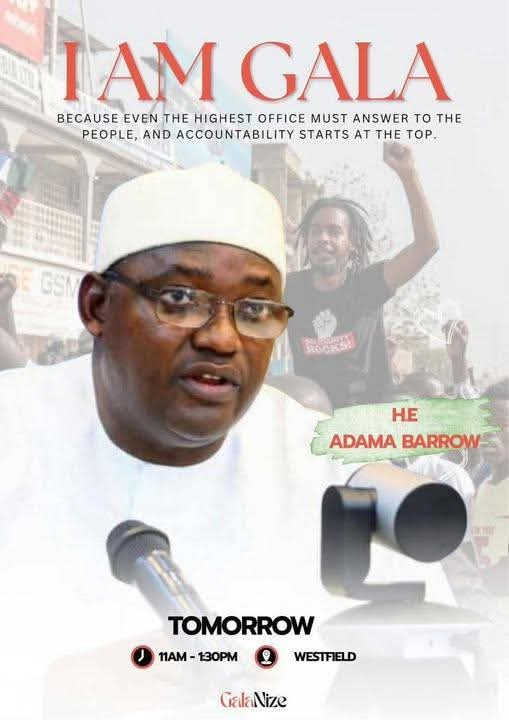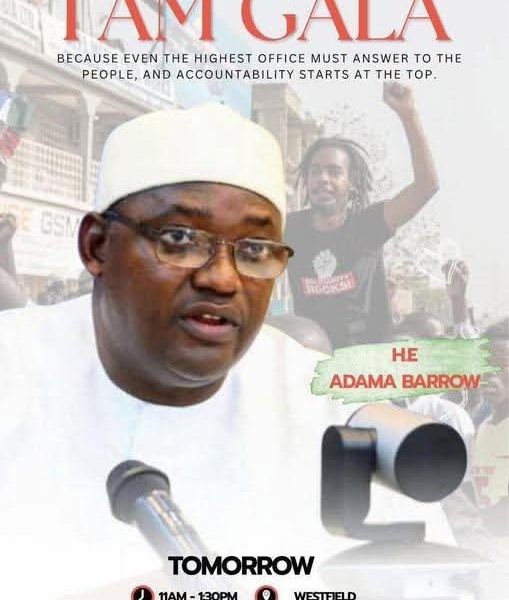
Democracy is not defined by the ballot but by how those in power respond to protest. In The Gambia, where silence once felt safer than speaking out, President Adama Barrow’s decision to authorize a peaceful demonstration led by the Gambian Youths Against Looted Assets (GALA) marks a significant break from tyranny and a cautious step toward dignity.
This permit is more than just a piece of paper; it is the government’s moral response to a question that Yahya Jammeh’s regime buried for two decades: Can we allow citizens to demand accountability without fear?
Tomorrow’s march is not merely about looted assets; it represents the restoration of a voice for a people who have long been silenced and demonstrates that democracy lives not just in slogans but in the streets filled with peaceful, defiant demonstrators. Where protest once meant persecution?
For twenty-two years, Yahya Jammeh’s regime treated peaceful assembly as an act of treason. The Public Order Act, rooted in colonial control and sustained by dictatorial paranoia, was routinely used to silence critics, disrupt gatherings, and legitimize brutality. It was not a law for maintaining order but rather an edict of repression. Opposition leaders were not spared. In 2009, Femi Peters, an official of the United Democratic Party, was arrested and convicted simply for organizing a peaceful rally, denied a police permit under the oppressive weight of the Public Order Act. Elder statesman Lamin Waa Juwara also faced judicial harassment, serving as a warning to those who dared invoke the Constitution in the face of fear.
The regime’s cruelty was exemplified by the tragic story of Solo Sandeng, a youth leader who advocated for electoral reform on April 14, 2016. He was arrested, tortured, and murdered. His death not only revealed the depths of state violence but also illustrated the high cost of resistance under a government that criminalized citizenship.
This tragic history serves as the backdrop against which President Barrow’s action must be assessed. The permit granted to GALA is not just politically significant; it is deeply morally profound. The right to protest is not just a luxury; it is essential. It is enshrined in the 1997 Gambian Constitution and reaffirmed by international conventions that uphold our collective integrity. Article 21 of the International Covenant on Civil and Political Rights, Article 11 of the African Charter on Human and Peoples’ Rights, and other global instruments codify the principle that citizens have the right to assemble, dissent, and demand accountability.
For too long, however, the Gambian judiciary has remained cautiously silent, reluctant to confront the contradictions inherent in the Public Order Act. Cases such as Lawyer Ousainou Darboe v. Attorney General and Femi Peters v. The State have highlighted the gap between legal promises and political reality. The Public Order Act undermines the spirit of a free republic, and too many judges have failed to defend the Constitution with the bravery it requires.
Today, the Barrow government has broken that cycle. By recognizing the legitimacy of the GALA protest, it demonstrates a commitment to prioritize constitutionalism over control—an essential and overdue act of democratic maturity.
The Gambian Youths Against Looted Assets are not protesting for mere political theater. They are rallying against a system that has too often concealed corruption behind bureaucratic structures and buried accountability beneath polite governance. Their outrage is not reckless; it is righteous. They demand transparency. They challenge public theft. They refuse to accept the comfort of silent obedience. This is what democracy requires of its youth—not applause for politicians but principled confrontation. This peaceful protest, duly authorized, captures the spirit of a republic reclaiming its identity. It communicates to every Gambian citizen: your conscience is not illegal.
While neighboring governments tighten their grip on public discourse—responding to protests with violence and silencing dissenters—the Gambia is quietly leading the way. By respecting peaceful assembly, it shows that democracy is not afraid of disagreement. It affirms that leaders gain authority not solely through power but also through the participation of the people. However, this symbolic victory must not lead to complacency. The Public Order Act remains in effect, lingering like a constitutional ghost. The judiciary must rise with renewed independence. Civil society must stay vigilant. Citizens must remember that every right ignored today becomes a wound tomorrow.
The Gambia’s approval of the GALA protest may appear procedural. Yet, in a country once plagued by silence, it is profoundly spiritual. It signals to Africa and the world that governance need not fear dissent—that protest is not rebellion, but a necessary act of repair. While President Barrow deserves credit for passing this test of restraint, his government must prepare for a more challenging task ahead: fostering a culture where rights are not granted as favors but honored as foundational principles,
While neighboring governments tighten their grip on public discourse—meeting peaceful protests with violence and silencing critics through force—The Gambia quietly takes a stand. By respecting the right to peaceful assembly, it demonstrates that democracy is not afraid of disagreement. It honors the principle that leaders gain authority not only through power but through the consent and participation of the people. However, this symbolic victory should not lead to complacency.
The Public Order Act remains in place, like a lingering shadow over the Constitution. The judiciary must rise with renewed independence, civil society must remain vigilant, and citizens must remember that every right ignored today becomes a wound tomorrow.
The Gambia’s approval of the GALA protest may seem like a routine decision, but in a country once silenced by fear, it carries spiritual significance. It sends a message to Africa and the world that governance need not fear dissent—that protest is not an act of rebellion but a pathway to repair. While President Barrow deserves recognition for passing this test of restraint, his government must prepare for the more challenging task ahead: fostering a culture where rights are not granted as favors but are honored as foundational elements of society. Once awakened, freedom does not remain dormant. The right to protest—once respected—is no longer fragile. It becomes the bedrock upon which nations rise, voices resonate, and democracy thrives.
Let the GALA protest not just be a march but a lasting memory—a reminder that citizenship thrives in resistance, and that justice begins whenever a government allows its people to speak.





